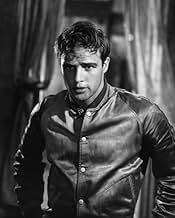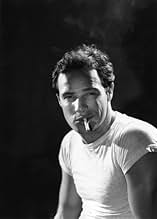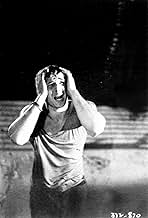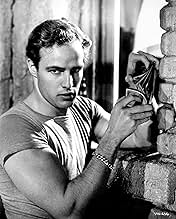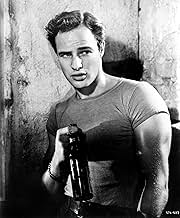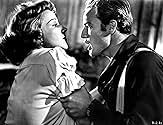Disturbed Blanche DuBois moves in with her sister in New Orleans and is tormented by her brutish brother-in-law while her reality crumbles around her.Disturbed Blanche DuBois moves in with her sister in New Orleans and is tormented by her brutish brother-in-law while her reality crumbles around her.Disturbed Blanche DuBois moves in with her sister in New Orleans and is tormented by her brutish brother-in-law while her reality crumbles around her.
- Won 4 Oscars
- 22 wins & 15 nominations total
James Adamson
- Extra
- (uncredited)
Irene Allen
- Extra
- (uncredited)
Mel Archer
- Foreman
- (uncredited)
Walter Bacon
- Club Patron
- (uncredited)
Dahn Ben Amotz
- Minor Role
- (uncredited)
- Director
- Writers
- All cast & crew
- Production, box office & more at IMDbPro
7.9118.9K
1
2
3
4
5
6
7
8
9
10
Featured reviews
Antebellum Delusions
Blanche DuBois reminds me of Norma Desmond in Sunset Blvd. (1950). Both characters succumb to their alter egos, and descend into their own worlds of fantasy and half-truths.
In "A Streetcar Named Desire", Blanche travels from her antebellum roots in Mississippi to New Orleans, to see her sister Stella. But, upon arriving in the Big Easy, Blanche must confront Stella's husband Stanley, a greasy, poker-playing neanderthal lout who knows a thing or two about reality. It's the clash between Blanche's stately delusions and Stanley's gritty realism that soups up the drama in this Tennessee Williams play, converted to film classic by director Elia Kazan.
The drama is absorbing. But the performances of Marlon Brando and Vivien Leigh, as Stanley and Blanche, are what make the film the cinematic powerhouse that it is. Excellent B&W lighting and jazzy background music amplify the seedy, sleazy atmosphere, which adds depth and texture to the story and the acting. And, of course, the claustrophobic, steamy French Quarter makes a perfect setting.
As one would expect for a film derived from a play, "A Streetcar Named Desire" is very talky. Generally, I don't care for films burdened with a ten thousand page script. But this talk-fest is an exception. Overwhelming what I would otherwise consider a weakness, the acting of Brando and Leigh alone are enough to justify a two hour investment, and render an enjoyable and memorable cinematic experience.
In "A Streetcar Named Desire", Blanche travels from her antebellum roots in Mississippi to New Orleans, to see her sister Stella. But, upon arriving in the Big Easy, Blanche must confront Stella's husband Stanley, a greasy, poker-playing neanderthal lout who knows a thing or two about reality. It's the clash between Blanche's stately delusions and Stanley's gritty realism that soups up the drama in this Tennessee Williams play, converted to film classic by director Elia Kazan.
The drama is absorbing. But the performances of Marlon Brando and Vivien Leigh, as Stanley and Blanche, are what make the film the cinematic powerhouse that it is. Excellent B&W lighting and jazzy background music amplify the seedy, sleazy atmosphere, which adds depth and texture to the story and the acting. And, of course, the claustrophobic, steamy French Quarter makes a perfect setting.
As one would expect for a film derived from a play, "A Streetcar Named Desire" is very talky. Generally, I don't care for films burdened with a ten thousand page script. But this talk-fest is an exception. Overwhelming what I would otherwise consider a weakness, the acting of Brando and Leigh alone are enough to justify a two hour investment, and render an enjoyable and memorable cinematic experience.
Love the Movie, Not the Characters
The performances in this movie are so awesome they make you forget how reprehensible most of the characters are. And the fact that Brando didn't win the best actor award is mind blowing (he lost to Borgart in The African Queen)
This is a Tennessee Williams script so you know there will be plenty of drinking and drama and destitution. And awesome lines like "you can't describe someone you're in love with" and "funerals are pretty compared to deaths" and of course "I don't want realism. I want magic!"
Brando's Stanley Kowlaski is the alpha of this story. He is the loud, abusive, good-looking über-male whose wife is seemingly turned on by his apathy and even abuse. And the fact that Vivien Leigh's Blanche is also aroused by Stanley's persona only emboldens his behavior. I'm torn by situations like this because I've always believed men who physically abuse women are horrible. But women who forgive those men also enable them. And that's the challenge I have with these situations whether they are in real life or in the arts. Who am I to condemn a guy for smacking his woman around when she is so quick to forgive?
This is the original film version of this story and I think it's better than any of the remakes. I don't like Stanley Kowlaski but I love how Marlon Brando plays him. And again, he was robbed not getting the Oscar (and I LOVE Humphrey Bogart).
This is a Tennessee Williams script so you know there will be plenty of drinking and drama and destitution. And awesome lines like "you can't describe someone you're in love with" and "funerals are pretty compared to deaths" and of course "I don't want realism. I want magic!"
Brando's Stanley Kowlaski is the alpha of this story. He is the loud, abusive, good-looking über-male whose wife is seemingly turned on by his apathy and even abuse. And the fact that Vivien Leigh's Blanche is also aroused by Stanley's persona only emboldens his behavior. I'm torn by situations like this because I've always believed men who physically abuse women are horrible. But women who forgive those men also enable them. And that's the challenge I have with these situations whether they are in real life or in the arts. Who am I to condemn a guy for smacking his woman around when she is so quick to forgive?
This is the original film version of this story and I think it's better than any of the remakes. I don't like Stanley Kowlaski but I love how Marlon Brando plays him. And again, he was robbed not getting the Oscar (and I LOVE Humphrey Bogart).
10JFHunt
Hey Stella.....STELLA!
I often asked myself this question with mixed responses. Did Brando make Streetcar great? Or was he just great in it?
Vivien Leigh is simply haunting and never not shocking. There is more going on there than just a performance. She appears out of herself and hovering ever so softly above. As for the rumored mental illnesses, I can only speculate. I do know for sure that her visualization of Blanche DuBois is the single best performance by an actress I've seen. Well that might not mean much, but I've seen a lot of movies.
Brando made On the Waterfront a classic, but Leigh made Streetcar unforgettable. I always felt like it was a continuation from her most timeless role as Scarlett O'Hara in Gone with the Wind. Like what would have happened to Scarlett, if she was allowed to grow old. Maybe I'm just crazy. But I think the billing says it all; Vivien Leigh, Marlon Brando, Kim Hunter, Karl Malden. I don't think you could dream up a finer cast. Brando might have been the sexiest thing alive, but it's obvious that Leigh made this film great with some memorable help from some movie icons.
Brando may have sent an Indian to receive his second Oscar, but Leigh used her second as a doorstop to her bathroom.
Vivien Leigh is simply haunting and never not shocking. There is more going on there than just a performance. She appears out of herself and hovering ever so softly above. As for the rumored mental illnesses, I can only speculate. I do know for sure that her visualization of Blanche DuBois is the single best performance by an actress I've seen. Well that might not mean much, but I've seen a lot of movies.
Brando made On the Waterfront a classic, but Leigh made Streetcar unforgettable. I always felt like it was a continuation from her most timeless role as Scarlett O'Hara in Gone with the Wind. Like what would have happened to Scarlett, if she was allowed to grow old. Maybe I'm just crazy. But I think the billing says it all; Vivien Leigh, Marlon Brando, Kim Hunter, Karl Malden. I don't think you could dream up a finer cast. Brando might have been the sexiest thing alive, but it's obvious that Leigh made this film great with some memorable help from some movie icons.
Brando may have sent an Indian to receive his second Oscar, but Leigh used her second as a doorstop to her bathroom.
"Where I'm Not Wanted and Ashamed to Be"
"Streetcar Named Desire" is an exceptional film, thanks to three essential components: (1) the superb acting ability of its two leads, Vivien Leigh and Marlon Brando, as well as that of the supporting cast, small in number but huge in its combined dramatic power, (2) an excellent screenplay by the original playwright, Tennessee Williams, that is packed from beginning to end with explosive, conflict driven dialogue, and (3) the brilliant direction of Elia Kazan who so skillfully brings the play to the screen.
In its legendary opening, Blanche DuBois (Vivien Leigh) emerges from a cloud of locomotive smoke and is helped onto a streetcar by a perfect stranger, a sailor. This simple act neatly ties the film's beginning to Blanche's final, heartbreaking line, "I have always depended upon the kindness of strangers". She, as the central character, is lost in the big city, and she becomes more and more hopelessly adrift in the world as the film approaches its very tragic end.
Broke and friendless, Blanche lands in New Orleans where her sister, Stella (Kim Hunter) lives with her coarse, crude husband, Stanley Kowalski (Brando). Having lost her ancestral home on account of family-related debt and having been dismissed under vague circumstances from her position as a high school English teacher in the small Mississippi town from where she came, she has no other place to go at a time of dire need.
Although Stella is genuinely concerned about Blanche's declining physical and mental state, the shabby apartment where she lives with Stanley consists of two small rooms, barely enough space for the Kowalskis even without Stanley's regular poker group, which seems to park itself there at every available opportunity. What makes matters worse is Stanley's loud and boisterous personality. From the start, Stanley resents the presence of Blanche, which he views as an unwanted, disruptive invasion of his marriage and his home. He regards her with total distrust and disdain. Another reviewer here interpreted this as a cultural clash between the old and the new South, and I think that is a very astute observation. In any case, Stanley is totally unsympathetic to Blanche's plight and looks upon her with nothing but suspicion and contempt.
Blanche is trapped in the claustrophobic and confining prison of the dingy Kowalski apartment. For one, fleeting moment, she believes that Mitch (Karl Malden), Stanley's poker buddy and co-worker, stands as her one bright hope of liberation from the walls that continue to close around her, but he turns out to be anything but her desperately needed "knight in shining armor". Tragically, Mitch, a weak individual who is still dominated by a strong mother well into his adulthood, is the last person with the ability to give Blanche the love and strength that she so urgently needs and to whisk her away from the stifling, debilitating atmosphere of the Kowalski dungeon. Blanche's one, last hope for personal redemption soon fades away forever.
I read that, under different circumstances, the lead roles could have been awarded to Olivia de Haviland and John Garfield. As much as I like them both, this would have been a much different movie with them as the leads. Ms. Leigh, a stunning Englishwoman who managed to score two Oscars for playing two iconic, southern American characters, portrays a mentally declining Blanche with great depth and compassion. As to Mr. Brando's brutish and obnoxious Stanley, you've got to see him in action to appreciate his magnificent performance. As in the case of his Terry Malloy in "On the Waterfront", I don't believe that Stanley's most famous lines from this film would be among the most imitated to this day if they weren't delivered so dynamically by Brando in the first place. "Hey, Stel-la!" Sorry. I just couldn't help myself.
While Brando was beaten out of the Oscar by Humphrey Bogart in "African Queen" (not my favorite Bogey movie by a long shot), Leigh, Malden, and Hunter swept the awards for their performances here and deservedly so. The memorable role of feisty neighbor Eunice also launched Pat Hillias's successful career throughout the golden age of television during the 1950's until her tragic and untimely death in 1960.
If you want to watch an unforgettable rendering of a strong, intense script that is worthy of such a talented cast and director, don't miss this one.
In its legendary opening, Blanche DuBois (Vivien Leigh) emerges from a cloud of locomotive smoke and is helped onto a streetcar by a perfect stranger, a sailor. This simple act neatly ties the film's beginning to Blanche's final, heartbreaking line, "I have always depended upon the kindness of strangers". She, as the central character, is lost in the big city, and she becomes more and more hopelessly adrift in the world as the film approaches its very tragic end.
Broke and friendless, Blanche lands in New Orleans where her sister, Stella (Kim Hunter) lives with her coarse, crude husband, Stanley Kowalski (Brando). Having lost her ancestral home on account of family-related debt and having been dismissed under vague circumstances from her position as a high school English teacher in the small Mississippi town from where she came, she has no other place to go at a time of dire need.
Although Stella is genuinely concerned about Blanche's declining physical and mental state, the shabby apartment where she lives with Stanley consists of two small rooms, barely enough space for the Kowalskis even without Stanley's regular poker group, which seems to park itself there at every available opportunity. What makes matters worse is Stanley's loud and boisterous personality. From the start, Stanley resents the presence of Blanche, which he views as an unwanted, disruptive invasion of his marriage and his home. He regards her with total distrust and disdain. Another reviewer here interpreted this as a cultural clash between the old and the new South, and I think that is a very astute observation. In any case, Stanley is totally unsympathetic to Blanche's plight and looks upon her with nothing but suspicion and contempt.
Blanche is trapped in the claustrophobic and confining prison of the dingy Kowalski apartment. For one, fleeting moment, she believes that Mitch (Karl Malden), Stanley's poker buddy and co-worker, stands as her one bright hope of liberation from the walls that continue to close around her, but he turns out to be anything but her desperately needed "knight in shining armor". Tragically, Mitch, a weak individual who is still dominated by a strong mother well into his adulthood, is the last person with the ability to give Blanche the love and strength that she so urgently needs and to whisk her away from the stifling, debilitating atmosphere of the Kowalski dungeon. Blanche's one, last hope for personal redemption soon fades away forever.
I read that, under different circumstances, the lead roles could have been awarded to Olivia de Haviland and John Garfield. As much as I like them both, this would have been a much different movie with them as the leads. Ms. Leigh, a stunning Englishwoman who managed to score two Oscars for playing two iconic, southern American characters, portrays a mentally declining Blanche with great depth and compassion. As to Mr. Brando's brutish and obnoxious Stanley, you've got to see him in action to appreciate his magnificent performance. As in the case of his Terry Malloy in "On the Waterfront", I don't believe that Stanley's most famous lines from this film would be among the most imitated to this day if they weren't delivered so dynamically by Brando in the first place. "Hey, Stel-la!" Sorry. I just couldn't help myself.
While Brando was beaten out of the Oscar by Humphrey Bogart in "African Queen" (not my favorite Bogey movie by a long shot), Leigh, Malden, and Hunter swept the awards for their performances here and deservedly so. The memorable role of feisty neighbor Eunice also launched Pat Hillias's successful career throughout the golden age of television during the 1950's until her tragic and untimely death in 1960.
If you want to watch an unforgettable rendering of a strong, intense script that is worthy of such a talented cast and director, don't miss this one.
10Rathko
Sexy, Brutal, and Endlessly Fascinating
There is little to be said about this movie that thousands of critics have not stated already. It is a magnificent piece of cinema, with an intricate script delivered by actors at the peak of their talents. Leigh is unbearably brittle and fragile and she dances precariously on the edge of sanity. Marlon Brando embodies a sense of brooding masculinity that other men can only dream of attaining, while creating an enduring cinema icon and delivering one of the all-time great movie lines. From the raucous jazz score to the sleazy production design bathed in smoldering grey, 'Streetcar' is a class-act from beginning to end; sexy, brutal, and endlessly fascinating.
Did you know
- TriviaAs the film progresses, the set of the Kowalski apartment actually gets smaller to heighten the suggestion of Blanche's increasing claustrophobia.
- GoofsWhen Stanley is about to give Blanche the birthday "gift" of a ticket back home Marlon Brando opens the wallet to discover that the envelope with the ticket it missing. There is a sharp edit and then the scene continues with the wallet missing from Stanley's hand and replaced with the envelope containing the ticket.
- Alternate versionsThe scene in which Blanche and Stanley first meet was edited a bit to take out some of the sexual tension that both had towards each other when the film was first released in 1951. In 1993, this footage was restored in the "Original Director's Version" of the film. The three minutes of newly-added footage sticks out from the rest of the film because Warner Brothers did not bother to restore these extra film elements along with the rest of the movie, leaving them very scratchy due to deterioration.
- ConnectionsEdited into Un Américain nommé Kazan (2018)
- SoundtracksIt's Only a Paper Moon
(1933) (uncredited)
Music by Harold Arlen
Lyrics by E.Y. Harburg and Billy Rose
Sung by Vivien Leigh while doing her hair
Details
- Release date
- Country of origin
- Languages
- Also known as
- Un tranvía llamado Deseo
- Filming locations
- New Orleans, Louisiana, USA(railway station)
- Production companies
- See more company credits at IMDbPro
Box office
- Budget
- $1,800,000 (estimated)
- Gross worldwide
- $55,437
- Runtime
- 2h 2m(122 min)
- Color
- Aspect ratio
- 1.37 : 1
Contribute to this page
Suggest an edit or add missing content







